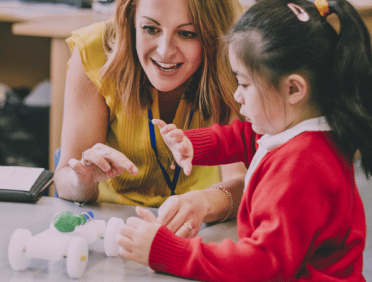Becoming a teaching assistant is an entirely different type of job from other roles out there. There are set skills and attributes you will need as a teaching assistant that you may not have with other jobs that you have done in the past.
If you are facing a brand new position as a teaching assistant, we have put together 12 key tops that you should keep in mind.
Be friendly and approachable
One of the best things you can do for yourself is to be as friendly and approachable as possible. A teaching assistant who is not friendly and approachable will not do well at their job.
You may not realise it, but children can pick up on the emotions or feelings of the adults around them, even if you are trying your best to paste a smile on when you are feeling down.
Organise the classroom
Much like many things in life, an organised classroom is a classroom that is going to work just as it should. Whilst teachers are busy doing their job; a teaching assistant can tackle the issue of all the clutter and mess that can build up in the classroom over time.
It can feel like a never-ending battle to keep a busy classroom busy (especially when you are busy doing 101 other tasks), but we can promise you that this is something that you should be focused on every day.
Develop strong working relationships
If you ask any teacher, teaching assistant or support staff member what one of the best things about working in a school is, they are likely to tell you that being a part of a working family is up there with the rest of them.
You need to do whatever you can to ensure that you build as strong a working relationship as you can with those around you. This is particularly true regarding the teacher and any other teaching assistants you may work with in class.
You should be there for one another, support one another and make sure that you are shoulder to cry on and ear to listen to, just when you need to be able to share what is on your mind.
Show dedication
A dedicated TA is a TA who is going to succeed in their role. This means you must try as much as possible to show dedication to your job. Come in daily and focus on what you need to (or would like to) get done on that day.
There is a good chance that you won’t be able to get everything you need done on that day. But, if you show willingness and you are ready to try and reach those goals, then this can be enough to get you closer to where you want to be.
Be proactive & take initiative
Much of your time in the classroom will be spent working under your own steam. Teachers are going to be busy, and they are going to have their task list to tackle. This means you must consider what jobs you need to do and how you can best approach them.
Not only this, but you should also be able to notice things that need to be done around the classroom, the school or perhaps to help certain children and highlight these to your teacher. Or just get on and get them done yourself if you have the ability.
Be flexible and adaptable
No two days will be the same when you work in a school. This means that one of the best things you can do for yourself is approach each day with flexibility and adaptability. You may be used to working in one classroom, but the next day, you may be asked to move into another classroom to help them and the children that work in the class.
Be calm and patient
Working with children can be taxing on your patience. There are lots of things that can make you feel stressed out. This includes dealing with parents, tackling challenging behaviour and trying to help children learn when they cannot understand their learning.
Facing each day calmly and patiently means you can keep smiling even under pressure. Not only does this help your mood, but the children you work with are also going to pick up on these feelings and are much more likely to feel positive about their learning.
Understand pupils needs
Children can be complicated, and no two children are the same. This means that you need to be able to identify the differences between each of the children in your classroom. Not only this, but you also need to consider the needs of each of these children.
You may not be able to identify them straight away, but working with children and learning more about their approach to learning and anything they find challenging is half of the battle.
You can then discuss with your teacher the notes you have taken on the child and come together to create a plan on what needs to be done to help them achieve the best they can.
Preparation is key
Time is limited when you are a teaching assistant, and the last thing you want to do is miss something, make mistakes or forget to do things because you haven’t prepared properly. The only thing that you need to think about is when you will get the chance to prepare. Sometimes this will be after school, before school or on any breaks.
This is just the nature of your role, and we can assure you that it might be frustrating to have to prepare at those times, but you will be grateful that you did.
Get your teaching assistant qualifications
You can get a teaching assistant job (and be a great teaching assistant, for that matter) without any qualifications. However, we can promise you that if you do take the time to study and learn more about the teaching assistant role will help you.
There are a variety of ways that you can study. Some schools offer it as a part of working with them, whilst others may suggest that you book to attend college or study online. It is down to you, and you should think about how much time you have to spare and whether this will work with your job role and family commitments.
Communication is vital
No matter your job, there is a good chance that you will know that communication is essential. This is very true when you work in a school. You need to be able to communicate with those who you work with.
This can sometimes be rushed; this can sometimes be time critical. The important thing is that you find a way to communicate with those around you.
Ask for help when you need it
It can be hard to ask for help from those around you, especially when trying to do your best in your job. However, when you are a teaching assistant, you need to make sure that you think about how you can ask those around you for help.
Not only will this help your workload, but you may even find that you learn different approaches that you may not have thought of doing otherwise. This can help you to think about how you make the most of your time and what you could do better.
To download a .pdf of this blog, please click here











